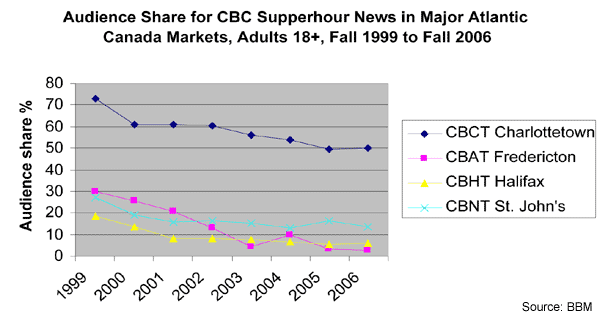Let me say straight off that I don’t trust those sons of bitches at Friends of Canadian Broadcasting.
Maybe it’s the communist-sounding name. Maybe it’s because the Canadian media always calls on Ian Morrison whenever they need an opinion about Canadian Broadcasting, like there’s no one else who can talk about it. Maybe it’s their alarmist mailouts that threaten an American domination that only Friends of Canadian Broadcasting can stop. Maybe it’s the $2 million these mailouts scare up in donations.
Where does it go?
Money, not for Canadian broadcasting, but for lobbying for Canadian broadcasting.
Nice work if you can get it, I suppose.
Despite these misgivings they do have a point about the apparent hari-kari CBC News is being asked to commit by running local hourlong news shows on a 30 minute budget. According to Friends, if what happened in St. John’s is any indication, when budgets went down so did audiences. But proving causes is a different matter. As this chart shows, ratings were already going down before the switch to a 1 hour format in St. John’s. They had been going down for 6 years. And didn’t the fragmentation of the market also have something to do with it? Weren’t everyone’s ratings going down?
But proving causes is a different matter. As this chart shows, ratings were already going down before the switch to a 1 hour format in St. John’s. They had been going down for 6 years. And didn’t the fragmentation of the market also have something to do with it? Weren’t everyone’s ratings going down?
It’s comical that in presenting this brutal chart, Friends is only interested in the last year of it, which is the least dramatic part.
Maybe it would be more useful to ask why Fredericton’s ratings went into a nightmarish free-fall from 1999 to 2003?
Yet stretched out as thin as we are, stretching it out even further will certainly make its way onto the screen. Friends’ Noreen Golfman:
Knowing the outcome of asking local producers to mount a 60 minute show on a 30 minute budget, CBC management can only be on a mission to destroy CBC’s local and regional news franchise.
Or they’re banking on a lot of that sweet, handed-over-for-free gold: Citizen Journalism.
8:24 pm addendum:
Barry Kiefl sent me these charts which show the ratings for CBC News in the Maritimes over the last decade, compared to the competition. They are not for the weak of heart, but disprove the whole idea of audience fragmentation. What it shows is that people want local news now more than ever.

8 Comments
Why does the person who thought having four-minute commercial breaks in all the regional supperhour shows still have a job? These shows aren’t exactly Survivor.
Probably the same person who thinks the weather tease keeps people glued to the show until block four.
I’ve worked in both private TV and CBC stations. Certainly budget cuts are a big reason for the decline in local CBC TV news ratings over the years. But an even bigger reason is management. The CBC hired and promoted a lot of executive producers who had no passion, few ideas and were totally clueless about TV news. I have never worked at a private station where the executive producer didn’t know what the ratings were.. but at CBC shops many execs ignored the ratings and hid those numbers from staff. We also put a lot of effort into making elaborate current affairs documentaries on such banal topics as cancer survival, school lunches and war veterans that would air at 6:45 p.m. — buried in the middle of the newscast– and rarely promoted in newspapers or even on the air. We would spend weeks and months working on some current affairs reports that were often investigative but typically boring. Meanwhile the first 10 minutes of our local CBC newscasts were deadly– a collection of voice overs, dull legislative stories and sleepy reports told by disgruntled old-timers who were still kicking around the stations and keeping young people away from their staff jobs. The privates tended to have a team of hungry young aggressive reporters– they did live hits, they broke stories and they were in touch with the community. There was a weird arrogance to the CBC TV bosses… as if they knew what they were doing because they had won so many RTNDA awards for their in-depth features over the years. The reality was that we could barely cover a school shooting in our own town or a fire on a weekend. We may have won awards for our B and C block stories– but the viewers changed channels during the first 5 minutes. Some local shows have improved over the last year. Vancouver, Winnipeg and Montreal have good shows these days… but no one is watching them and it may be too late to stop the ship from sinking. Hiring is a big part of it. We still hire these brainy but inexperienced Ryerson and Carleton grads. We ought to hire the best reporters and producers from CTV and Global– after they have been in the industry for years. We seem to think it’s better to train people from scratch– but instead we have shows full of farty old journalists from the old days and painfully green young ones who are not polished enough to be CBC reporters.
As a resident of NL I eperienced first hand the effect of the regionalization of CBC in the nineties and I promptly left if in favour of the other station.
Now that the funding is coming back and better local programming with it….so am I.
You should see what the Real Estate people have done to demoralize St. John’s.
This problem has its roots in the budget cuts of December, 1990 when the CBC closed 11 local operations, suspended local television news and introduced what it called a “regional” television news system.
The idea, promoted under the ugly concept of “complementarity,” was that CBC radio would be the first stop for local news and information. The CBC network would report national news, and the previously local news operations were to deliver something called “regional news.”
As a result, CBC local news managers were ordered to stop doing weather and local sports in order to devote their resources to covering regional stories.
The results were predictable. The ratings for CBC’s local news began their long descent into virtual oblivion.
Despite a brief interlude during which a new team of senior managers tried to reverse the decline, another round of cuts in 1995 and even more cuts later in the decade led to the virtual abandonment of local news and the development of the largely unwatched and unwatchable Canada Now program.
The numbers speak for themselves. A check of the records will show that the CBC’s local news programs ranged between 650,000 and 850,000 viewers a night in the mid-1990s. (This is more than The National gets on most nights today.)
Canada Now clocked in somewhere between 175,000 and 225,000 viewers nationwide.
This compares with roughly 1.5 million viewers a night for the CTV local news programs and roughly 900,000 viewers for Global’s local news shows.
Despite the apparent lack of new funding for the revived local news programs on CBC, the numbers are starting to improve. Recently, they have occasionally exceeded 300,000.
It’s a beginning; and oh yes, weather and sports are back.
hmm, while there is no doubt the regional newscasts are underfunded, having worked for one of the privates and the CBC in a medium-sized market, the CTV affiliate put together an hour-long program nightly for close to what the 1/2 hour budget is for CBC. And, by the way, their hour-long newscast is consistently better in a few ways – they break more local stories, they have a newsier program and they do it all with the same size staff pool. Oh yeah, and the same teams also produces a nooner.
It’s funny, it seems there are so many people banking on ‘Citizen Journalism’ that soon it won’t be free anymore. Companies will start trying to outbid each other to get the content that was supposed to be free.
The problem with supper hour news in St. John’s, not very long ago the leading broadcast in the market, has multiple causes. As well as being underfunded the unit is very old and tired. And the few new faces before the cameras are perhaps not ready for primetime. It’s not their fault, there is just no farm team where they could hone the requisite skills. The decline was allowed to happen because regional and local leadership are, BY TORONTO DESIGN, incredibly weak. These are the problems you create when you advance yes-men, yes-women and neutered sheep instead of more problematic and demanding innovators. I have never had anything to do with CBC news, and have no ax to grind, so think I am a relatively objective observer of the situation. You cannot reasonably question The Friends’ central argument. It is absurd to ask someone to produce a 60 min show with the same budget they produced the 30 min show.